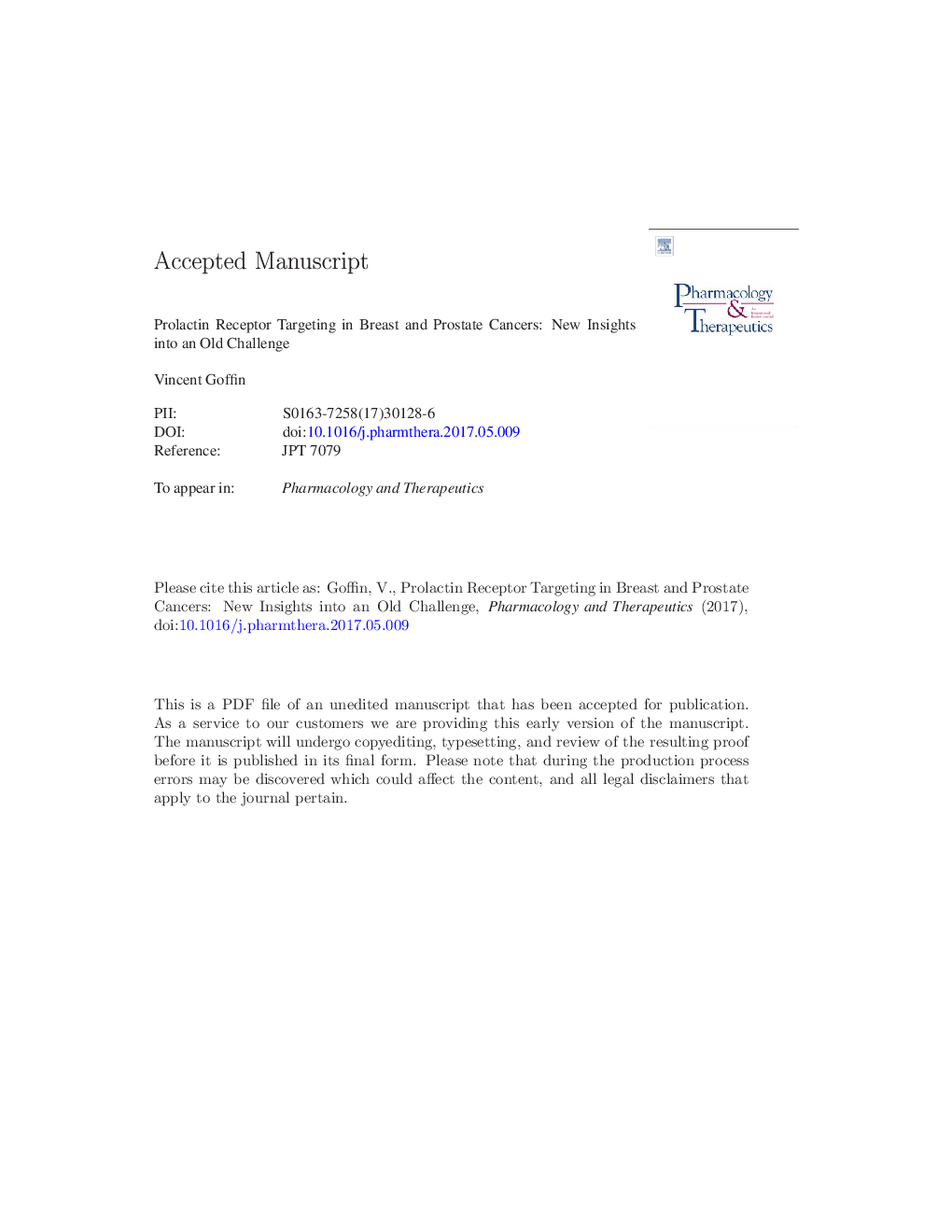| کد مقاله | کد نشریه | سال انتشار | مقاله انگلیسی | نسخه تمام متن |
|---|---|---|---|---|
| 8537026 | 1560926 | 2017 | 59 صفحه PDF | دانلود رایگان |
عنوان انگلیسی مقاله ISI
Prolactin receptor targeting in breast and prostate cancers: New insights into an old challenge
ترجمه فارسی عنوان
گیرنده پرولاکتین در سرطان سینه و پروستات هدف قرار دادن: بینش جدید به یک چالش قدیمی است
دانلود مقاله + سفارش ترجمه
دانلود مقاله ISI انگلیسی
رایگان برای ایرانیان
کلمات کلیدی
STAT5NHE-1PSAASOERKDMBAJAK2PRLRPRLECMTGFαSFKMMTVSERMJanus Kinase 2CRPCPDXmAbSPRMHER2ADTEGFRPI3KTNBC7,12-Dimethylbenz[a]anthracene - 7،12-Dimethylbenz [a] آنتراسنSrc family kinases - kinases خانواده SrcNa+/H+ exchanger 1 - Na + / H + مبدل 1antisense oligonucleotide - oligonucleotide antisensePatient-derived xenograft - xenograft مشتق شده از بیمارSTAT - آمارProstate specific antigen - آنتی ژن اختصاصی پروستاتtransforming growth factor alpha - تبدیل فاکتور رشد آلفاTRAMP - ترامپEMT - تکنسین فوریتهای پزشکیandrogen deprivation therapy - درمان اندروژن محرومیتTargeted therapy - درمان هدفمندCastration-resistant prostate cancer - سرطان پروستات مقاوم به کاستاریکاTriple-negative breast cancer - سرطان پستان سه گانه منفیProbasin - سعی کنیدStem/progenitor cells - سلول های بنیادی / پرون ژنراتورcytokeratin - سیتوکراتینCancer relapse - عود سرطانphosphoinositide 3-kinase - فسفینوزیتید 3-کینازLar - لارExtracellular matrix - ماتریکس خارج سلولیSignal transducer and activator of transcription - مبدل سیگنال و فعال کننده رونویسیSelective estrogen receptor modulator - مدولاتور گیرنده استروژن انتخابیProstate intraepithelial neoplasia - نئوپلاسی داخل صفاق پروستاتGrowth hormone - هورمون رشدMouse mammary tumor virus - ویروس تومور پستان موشMonoclonal antibodies - پادتنهای تَکتیرهProlactin - پرولاکتین PIN - پینextracellular signal-regulated kinase - کیناز تنظیم شده سیگنال خارج سلولیepithelial-to-mesenchymal transition - گذار اپیتلیال به مزانشیمالAndrogen Receptor - گیرنده آندروژنیEstrogen receptor - گیرنده استروژنEpidermal growth factor receptor - گیرنده فاکتور رشد اپیدرمالprolactin receptor - گیرنده پرولاکتین
موضوعات مرتبط
علوم پزشکی و سلامت
داروسازی، سم شناسی و علوم دارویی
داروشناسی
چکیده انگلیسی
In the era of precision medicine, the identification of new targets is a constant challenge to improve cancer therapy. Preclinical investigations, epidemiological studies and analyses of tissue specimens from patients strongly support the contribution of prolactin receptor (PRLR) signaling to breast and prostate tumorigenesis and cancer progression. Although a clear causative link with mutations of the genes encoding prolactin or its receptor is lacking, increased PRLR signaling in these cancers can be assessed by the overexpression of cognate proteins and is often confirmed by over-activation of downstream signaling effectors. Nevertheless, the PRLR neutralizing antibody LFA102 tested recently in a Phase I trial in advanced, PRLR-positive prostate cancer and breast cancer patients failed to provide any clinical benefit. This underlines the need to better understand the actual impact of PRLR signaling on the progression of these cancers. Canonical PRLR-triggered signaling cascades include STAT5A/B, ERK1/2, PI3K/Akt, FAK and Src family kinases. Recent studies suggested that the nature and the outcome of PRLR signaling might be markedly different in breast than in prostate cancer. In the latter, like in many organs, PRLR/STAT5 signaling acts as a pro-tumorigenic pathway. In particular, it promotes the amplification of treatment-resistant prostate stem/progenitor cells, predicts early cancer recurrence and favors metastatic dissemination. In contrast, PRLR/STAT5 signaling was recently proposed to prevent breast cancer cell dissemination and to predict favorable clinical outcomes. While there is no evidence that pathways other than STAT5 are activated by prolactin in the prostate, these alternate signaling cascades may be primarily responsible for the pro-tumorigenic effects of prolactin in breast cancer. If these conclusions are confirmed in future studies, the therapeutic targeting of PRLR signaling in breast and prostate cancer may warrant the development of organ-specific strategies.
ناشر
Database: Elsevier - ScienceDirect (ساینس دایرکت)
Journal: Pharmacology & Therapeutics - Volume 179, November 2017, Pages 111-126
Journal: Pharmacology & Therapeutics - Volume 179, November 2017, Pages 111-126
نویسندگان
Vincent Goffin,
